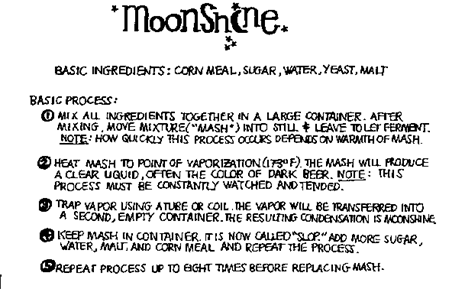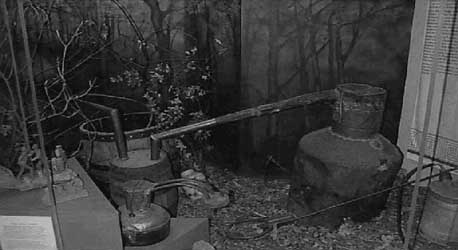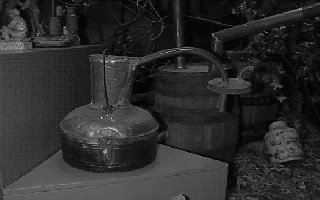
Makin' good moonshine is quite an art. It takes lots of time and practice before one can whip up a good batch that sells. Throughout history, there have been many ways of making moonshine. Some folks would add a special ingredient or perform a certain method during the distilling period to make their moonshine taste distinct.
Moonshiners and bootleggers have "code words" they use to talk to one another about the business. This secret language was used to protect them from the law. It is essential to get in on their lingo in order to understand the moonshine culture.
Here are the basics....a bootlegger is a person that sells illegal whiskey and
a moonshiner is a person who makes the whiskey illegally. Moonshine
goes by many names such as:
corn liquor...
white lightning...
sugar whiskey...
skull cracker...
popskull...
bush whiskey...
stump...
stumphole...
'splo...
ruckus juice...
rotgut...
catdaddy...
mule kick...
hillbilly pop...
white lightning...
panther's breath...
tiger's sweat...
sweet spirits of cats a-fighting...
alley bourbon...
city gin...
cool water...
happy Sally...
Blue John...
jump steady...
see seven stars...
old horsey...
block and tackle...
wild cat


A Wilkes County copper moonshine still, courtesy of Applachian Cultural Museum Applachian State University Boone, North Carolina
Rovin' Moonshiner by Asa Martin
Old Mountain Dew by Lunsford
Kentucky Moonshine by George Tucker
Scene from "Thunder Road"
The main character (Robert Mitchum) is a bootlegger who eludes revenuers.

Small still for use in a basement, Wilkes County
Appalachian Cultural Museum
Appalachian State University, Boone, NC
The term moonshine originated in Europe and was used in England in the 1700's. It originally referred to "occupational pursuits which necessitated night work, or work by the light of the moon."
The expression "bootlegging" has an long history itself. It originated in colonial America, and it believed to have been used in reference to selling alcohol to Native Americans. Some colonists tried to prevent this practice, but those that were more determined attempted to trade "spirits" for material goods. These colonists concealed bottles of liquor in the top of their boots and covered the bottles with their pants leg; hence the term "bootlegger."